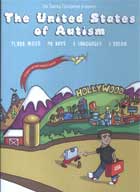
The United States of Autism 2011
Distributed by Janson Media, 88 Semmons Road, Harrington Park, NJ 07640; 201-784-8488
Produced by Richard Everts, Sugey Cruz-Everts, and Daniel Sokola
Directed by Richard Everts
DVD, color, 90 min.
General Adult
Sociology, Mental Health, Education, Psychology, Counseling, Social Work
Date Entered: 06/20/2014
Reviewed by Rodney Birch, Reference Librarian, George Fox UniversityMany parents who have children who are diagnosed as autistic often feel alone and isolated, wanting answers yet not feeling as people care or know what to say. Autism is no respecter of persons. It affects persons of all races, religions, socioeconomic, and family backgrounds, and the effects of autism are wide-ranging – from highly functioning to barely functioning (non-verbal, cannot care for themselves, etc.). The film provides viewers with a candid glimpse into the lives of people who deal with the ups and downs of having an autistic child. Everts also interviews both children and adults with autism so they have an opportunity to share what it’s like to autistic: “ How can we understand what autism is unless someone who has autism can explain it?” Many of those interviewed share their triumphs and struggles, but emphasize the need for advocacy and legislative action. One particularly interesting interview was from the perspective of one who believes he has been “cured” of autism. He noted that, “you should never decide in advance what a child is capable or not capable of doing,” and that’s more about understanding the person and the disorder than about finding a “cure.” In addition to the personal narratives, Everts also interviews persons in the medical and scientific communities, who have done research and other work related to autism, for their perspective. Many personal views on medical treatments, therapies, and interventions are described, but the film takes no action as to provide commentary on the validity or effectiveness of such treatments (or decision of parents to not treat their children). The basis of this documentary was a self-imposed exploration to find answers – of a father on a quest to find ways to interact with and better understand his own autistic child. Everts sets out on a cross-country journey to meet people of varying ethnic, religious, socioeconomic, and family backgrounds but who have one thing in common: autism. This DVD is a must-have resource for education-related programs, counseling, sociology, and social work.